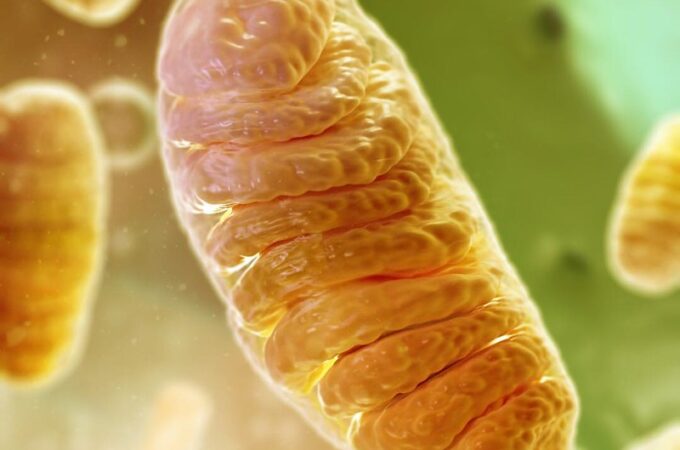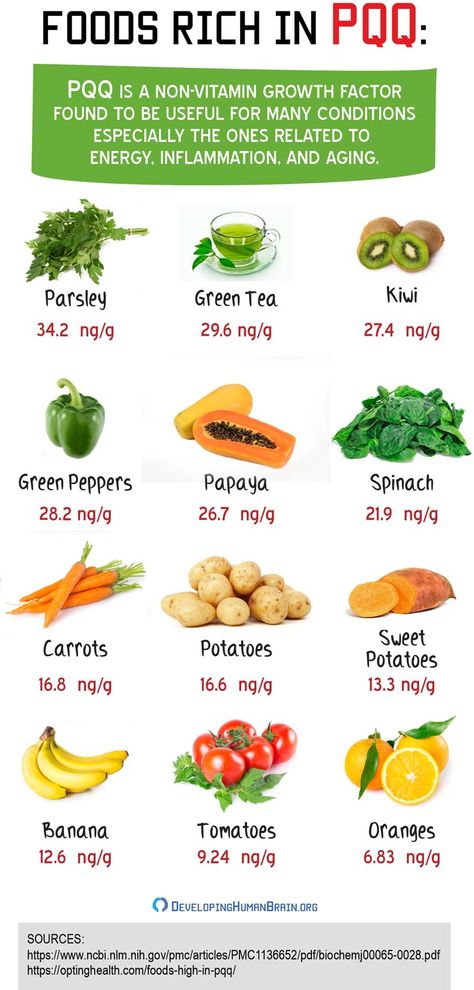
PQQ—The Longevity Nutraceutical—Powerfully Improves Mitochondria, Brain Function, Heart Health Metabolism
Erin Chamerlik, MS
Pyrroloquinoline quinone (PQQ) is promising as a longevity nutraceutical. It is a powerful antioxidant and has been shown to support cognitive and mitochondrial function and also reduces free radicals. (source) (source) (source)
Supports Mitochondrial Function and Number

Mitochondria, powerhouse organelles inside your cells, work to convert food into energy. As we age the number of functional mitochondria declines. (source)
PQQ is important for longevity and health as it works to improve mitochondria number and function. (source) In an animal study, PQQ increased lifespan by an average of 30 percent. The study concluded, “These results indicate that PQQ strongly prevented early death and extended lifespan.” (source)
PQQ is a potent plant growth factor that is ubiquitous in many types of bacteria, soil and plants, giving humans and animals a constant potential source. It is water soluble and heat stable. (source)
PQQ is found in fruits and vegetables and in human breast milk. (source)
PQQ Benefits:

- improves mitochondrial function and supports the growth of brand new mitochondria. (source) (source)
- protects the brain and improves memory and learning. (source) (source) 20mg PQQ per day improved cognitive function and improved regional blood flow in older adults. (source) (source) Mitochondrial function is vital for brain health as the brain uses 20% of the energy in the whole adult human body. (source)
- plays a key role in supporting eye health. The retina, like the brain, has high-energy demands making them particularly sensitive to mitochondrial dysfunction. (source)
- supports heart health, helps prevent cardiovascular diseases, improves the lipid profile and reduces triglycerides and LDL cholesterol. (source) (source) (source) (source) (source) In an animal study, rats fed PQQ showed an improvement in blood sugar and insulin levels and insulin sensitivity. (source)
- improves impaired glucose tolerance and offers benefits for those with type 2 diabetes. (source)
- provides anti-inflammatory benefits and decreases free radicals. (source)(source)(source)
- acts as a powerful antioxidant that is more stable than ascorbic acid. (source) (source) (source)
- plays an important role in supporting post-menopausal osteoporosis. PQQ inhibits oxidative stress and bone resorption. It has been shown to prevent osteoporosis induced by estrogen deficiency by preventing osteocyte senescence and stimulating osteoblastic bone formation. This study concluded that PQQ could be used for the prevention and treatment of postmenopausal osteoporosis. (source)
- improves the immune system and the body’s response to cytokines. (source)
- improves mood, tension and stress as measured by the Profile of Mood States-Short Form. “All six measures of vigor, fatigue, tension-anxiety, depression, anger-hostility and confusion were significantly improved following PQQ supplementation (20mg daily for eight weeks) compared with scores for those measures before administration of PQQ.” (source)
- improves sleep quality and duration. (source)
- offers protection from exercise-induced fatigue and oxidative damage. (source)
- supports the reduction of heart inflammation after COVID-19 infection or COVID-19 mRNA vaccines. A study, “PQQ Supplementation and SARS-CoV-2 Spike Protein-Induced Heart Inflammation” published in SAGE Public Health Emergency Collection, March 2022 stated: “SARS-CoV-2 spike protein-induced heart inflammation may originate from either COVID-19 infection or the administration of COVID-19 mRNA vaccines. As pyrroloquinoline quinone (PQQ) is a scavenger of free radicals, redox cofactor, and antioxidant which supports cognitive and mitochondrial functions, supplementation with PQQ could have a positive effect to reduce heart inflammation after COVID-19 mRNA vaccines.”(source) “As PQQ may help lower inflammation while also improving mitochondrial health, and also work as a detox, PQQ has the potential for an agent mitigating the damage from novel COVID-19 vaccines.” (source)
Food Sources of PQQ
PQQ is synthesized by soil bacteria and is taken up by plants consequently entering the human diet. (source)
Foods high in PQQ (ng PQQ/gram food): (source)
- Natto, fermented soybean, 61
- Parsley, 34.2
- Green bell pepper, 28.2
- Oolong tea, 27.7
- Kiwi, 27.4
- Papaya, 26.7
- Spinach, 21.9
- Broad beans, 17.8
- Carrot, 16.8
- Potato, 16.6
- Cabbage, 16.3

Food alone will not provide enough PQQ to be biologically significant.
A daily dose of 20mg of PQQ is considered to be safe and effective. It is nearly impossible to reach this level with food alone. For most people, PQQ is perfectly safe. There are no known contraindications for ingesting PQQ from food. The use of moderate PQQ supplementation appears to be free of unwanted side effects. (source)
Dosage: Supplements typically are in the range of 20 – 40mg. As part of an anti-aging lifestyle and supplement program consider starting with a dose of 10 or 20mg per day. PQQ can be taken with our without food. Please consult with your physician if you are undergoing treatment for a medical condition or if you are pregnant or lactating (source).
Recommended Supplements – Three Options
The three supplements below utilize BioPQQ® (Pyrroloquinoline Quinone). BioPQQ® is manufactured in Japan using a patented natural fermentation process to enhance absorption – derived from 100% all-natural sourced materials
My #1 Recommendation: PQQ Complex
PQQ Complex is formulated for the support of optimal mitochondrial health and energy production. PQQ Complex includes B12 with CoQ10 and Acetyl-L-Carnitine, two nutrients that also play critical roles in mitochondrial energy production.
Combines 20mg PQQ with 200mg CoQ10. PQQ has synergistic activity when combined with CoQ10, providing optimal mitochondrial function and energy production. Addresses mitochondrial dysfunction and oxidative stress.
CerebroVital PQQ-10
- BioPQQ is manufactured in Japan using a patented natural fermentation process to enhance absorption •Derived from 100% all natural sourced materials
- PQQ has synergistic activity when combined with CoQ10, providing optimal mitochondrial function and energy production
- Identical form of CoQ10 that is produced by the body for high bioavailability
- CoQ10 is known to reduce blood pressure in hypertensive patients and may require careful monitoring in this population. Not recommended for children.
- CoQ10 may prevent the adverse effects of medications which deplete CoQ10 levels, such as statin drugs. It may have additive effects when used with hypertension medications, requiring a reduction in dosage.
Affiliate links are in this post. This is not medical advice. Consult with your physician. If you grab anything we mention using our referral links, we may get a small commission. However, there’s no cost to you.
Recommended
-
Dandelion for Liver Support and Health BenefitsJuly 20th, 2024
-
Modified Citrus PectinJuly 11th, 2024
-
Bentonite Clay Mask for Face and ArmpitsJuly 8th, 2024
-
Two Supplements for Erectile DysfunctionJune 30th, 2024








